The Decent Working Hours indicator measures whether workers' health and well-being are preserved while ensuring their productivity and motivation. It assesses the relevant legislation on working hours, overtime, and paid rest days—weekly rest, public holidays, and annual leave.
2.1 General Weekly Working Hours
Does the law stipulate general weekly working hours as 48 hours or lower?
International Regulatory Standard
- Hours of Work (Industry) Convention, 1919 (No. 1)
- Hours of Work (Commerce and Offices) Convention, 1930 (No. 30)
- Forty-Hour Week Convention, 1935 (No. 47)
Articles 2 and 3 of Convention No.1 (C001) and Convention No.30 (C030), respectively, state that the working hours of employed persons should not exceed eight in the day and forty-eight in the week. Article 1 (C047) approves a forty-hour work week, which is applied in a way that does not reduce the living standard of workers due to reduced remuneration.
C001 states the following exceptions:
- the provision on the forty-eight-hour threshold does not apply to supervisory, management, and confidential positions,
- or whereby law, custom or agreement between employers’ and workers’ organisations or employers’ and workers’ representatives vary the daily hours limit (but not more than nine hours)
- or where shift workers are employed in excess of eight hours in a day and forty-eight hours in a week if the average hours over three weeks do not exceed eight per day and forty-eight per week.
Scoring Methodology
Whether labour legislation limits general working hours to 48 hours per week:
1: General working hours do not exceed 48 hours per week.
0: No restriction on weekly working hours is found in law or if general working hours are more than 48 hours per week.
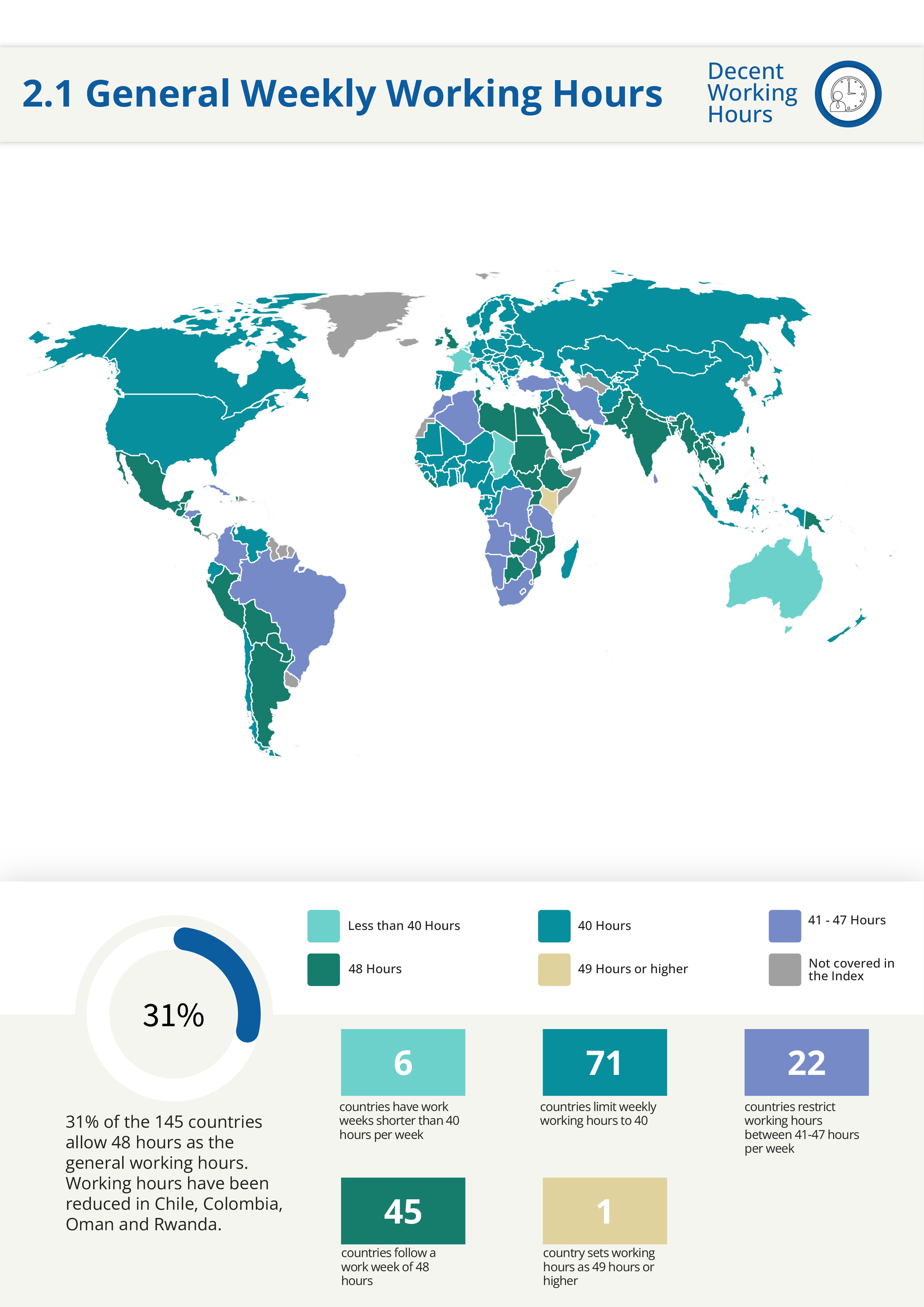
2.2 Maximum Weekly Working Hours
Does the law restrict maximum working hours, including overtime, to 56 hours per week?
International Regulatory Standard
- Hours of Work (Industry) Convention, 1919 (No. 1)
- Hours of Work (Commerce and Offices) Convention, 1930 (No. 30)
- Reduction of Hours of Work Recommendation, 1962 (No. 116)
The regulatory standard on this component, maximum weekly working hours, is grounded in Para 17 of the ILO’s Reduction of Hours of Work Recommendation, 1962 (No. 116), Article 6(2) of ILO’s Hours of Work (Industry) Convention, 1919 (No. 1) and Article 7(3) of the ILO’s Hours of Work (Commerce and Offices) Convention, 1930 (No. 30).
Recommendation No. 116 mentions that the competent authority of every country should determine limits to the total number of overtime hours worked during a specified period, except for cases of force majeure. Convention No. 1 and Convention No. 30 make it necessary for regulations (only after consultation with the organisations of employers and workers concerned) to fix the maximum of additional hours in each instance, aside from temporary exceptions, and the overtime pay rate to be not less than one and one-quarter times (125%) the regular rate.
Scoring Methodology
Whether labour legislation limits maximum working hours to 56 hours per week:
1: Total working hours, including overtime, do not exceed 56 hours per week.
0: Total working hours (including overtime) are more than 56 hours per week, or no relevant provision is found in the legislation.
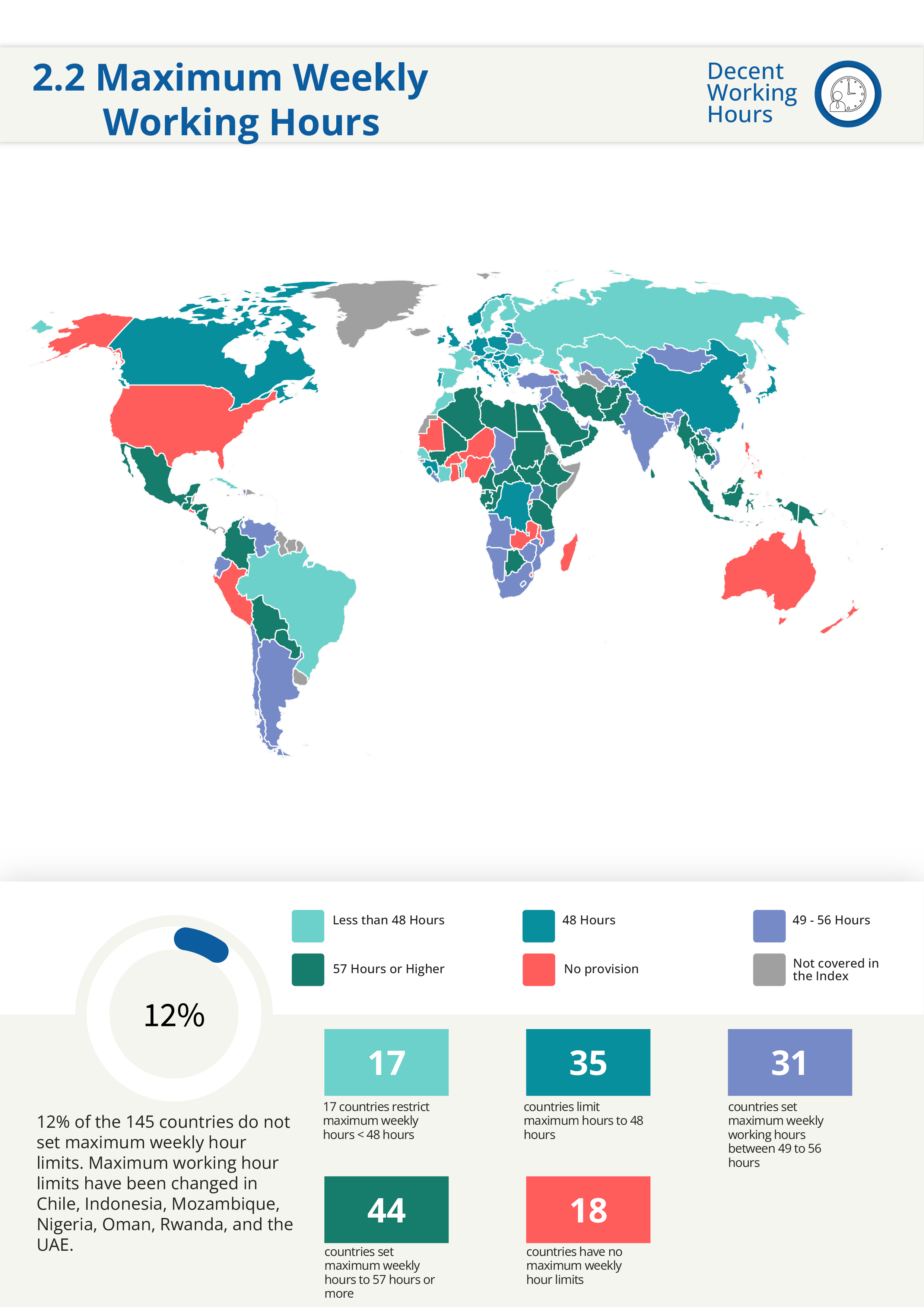
2.3 Weekly Rest Hours
Does the law require a paid weekly rest of at least 24 consecutive hours?
International Regulatory Standard
- Weekly Rest (Industry) Convention, 1921 (No. 14)
- Weekly Rest (Commerce and Offices) Convention, 1957 (No. 106)
Article 2 of the Weekly Rest (Industry) Convention, 1921 (No. 14) and Article 6 of the Weekly Rest (Commerce and Offices) Convention, 1957 (No. 106) stipulate that every seven days, a weekly rest (comprising at least 24 consecutive hours) be granted simultaneously to all workers in every establishment. The weekly rest should be fixed to coincide with the days already established by the traditions or customs of the country or region.
Scoring Methodology
Whether the labour legislation requires a weekly rest of at least 24 consecutive hours:
1: Workers have the right to a weekly rest for a minimum of 24 consecutive hours.
0: Labour legislation does not require a weekly rest period comprising 24 consecutive hours.
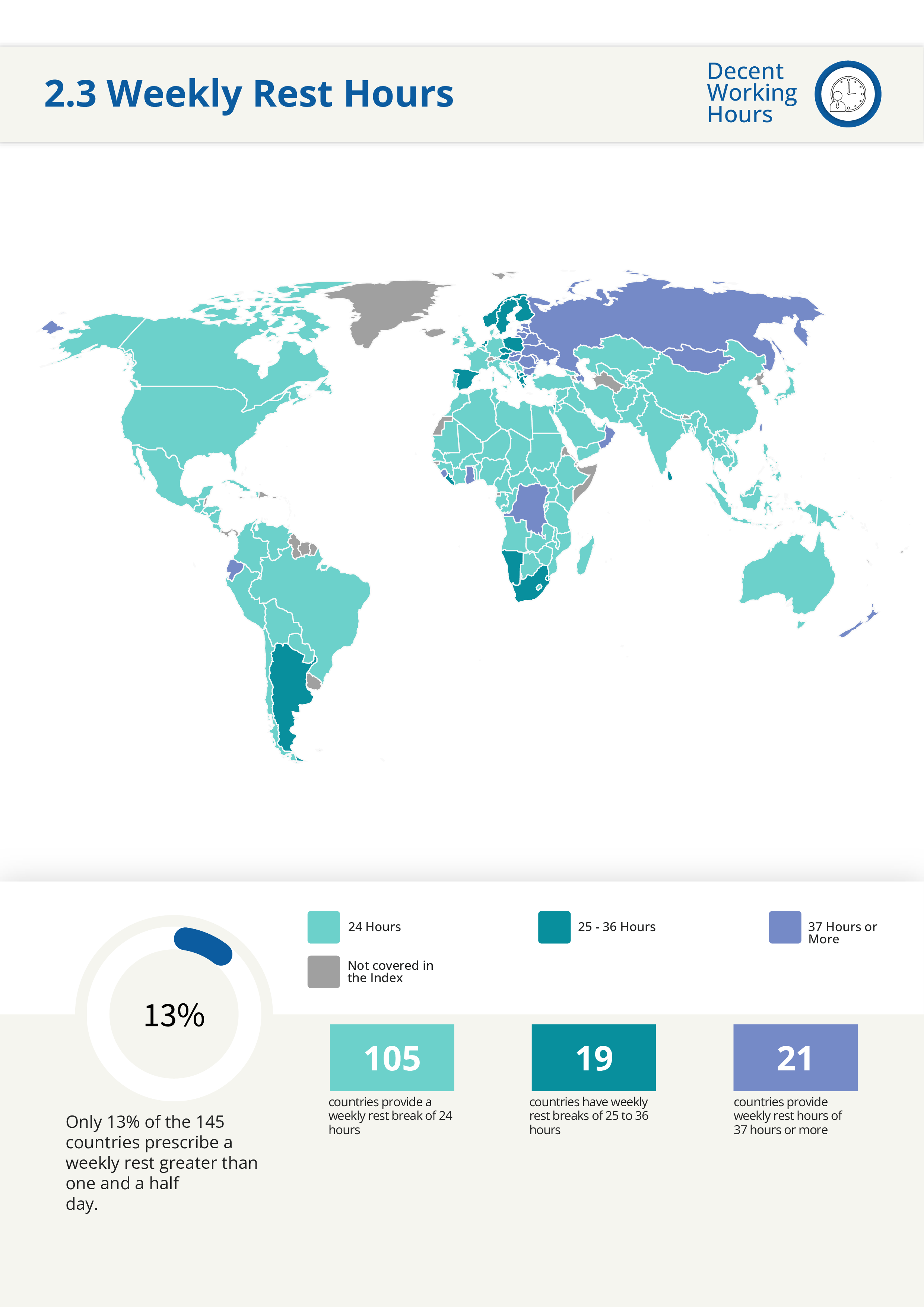
2.4 Paid Public Holidays
Does the law require paid public holidays?
International Regulatory Standard
- International Covenant on Economic, Social and Cultural Rights, 1966
- Working Conditions (Hotels and Restaurants) Convention, 1991 (No. 172)
- Part-Time Work Convention, 1994 (No. 175)
It is stated in Article 7(d) of the International Covenant on Economic, Social and Cultural Rights, 1966 that it is the right of everyone to enjoy just and favourable conditions of work that entail rest, leisure and remuneration for public holidays.
Article 5 of the ILO’s Working Conditions (Hotels and Restaurants) Convention, 1991 (No. 172) requires that “if workers are required to work on public holidays, they shall be appropriately compensated in time or remuneration, as determined by collective bargaining or in accordance with national law or practice”.
Article 7 of the ILO’s Part-Time Work Convention, 1994 (No. 175) also requires equal treatment of part-time workers, similar to the comparable full-time workers, concerning paid public holidays.
Scoring Methodology
Whether there are paid public holidays:
1: Legislation regulates paid public holidays, and there is a list of public and official holidays to follow.
0: Labour legislation does not require employers to grant a fully paid day off on public holidays.
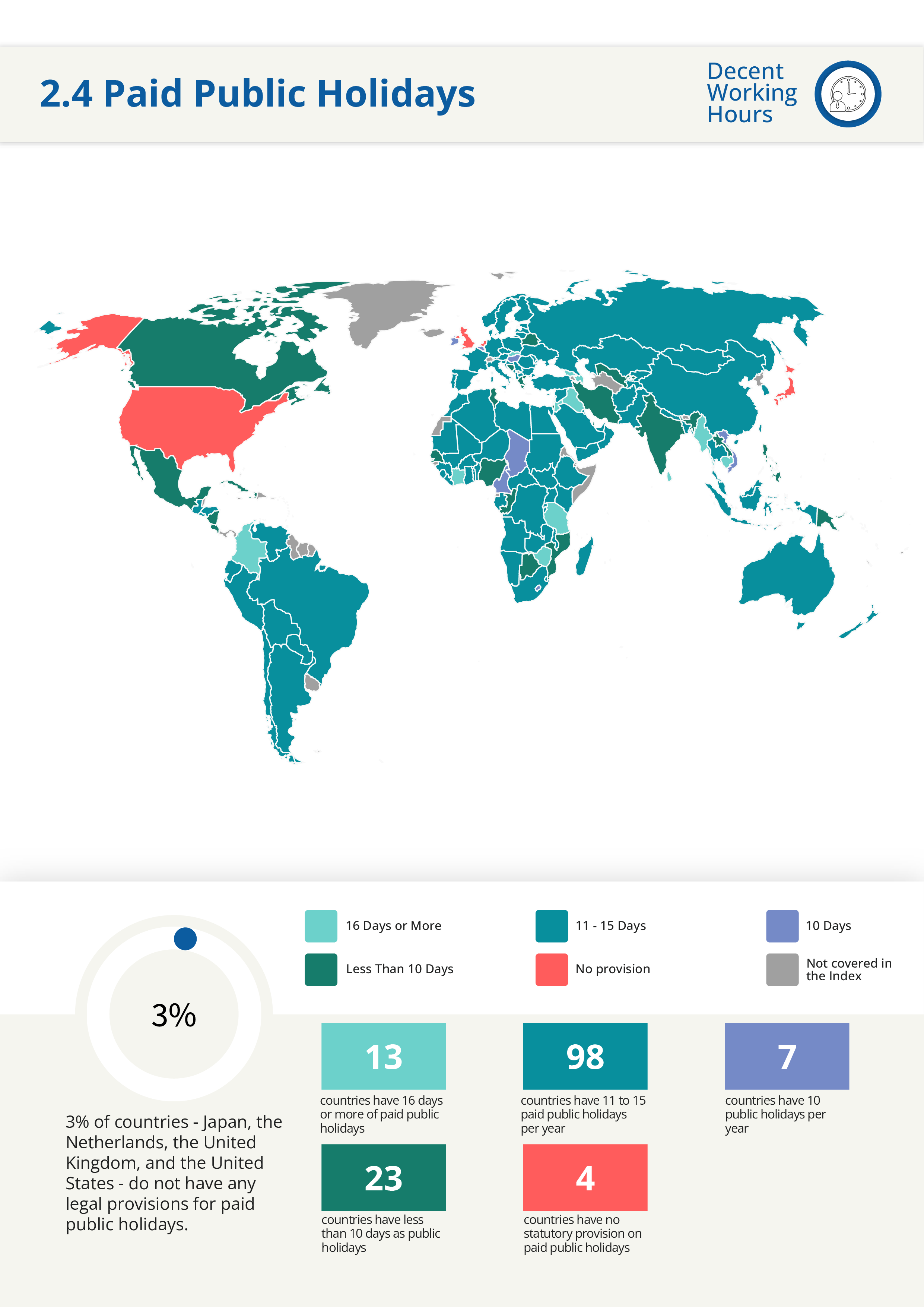
2.5 Annual Leave
Does the law require at least three working weeks of paid annual leave?
International Regulatory Standard
- Holidays with Pay Convention (Revised), 1970 (No. 132)
Article 3 of the ILO’s Holidays with Pay Convention (Revised), 1970 (No. 132) requires that every person to whom this Convention applies shall be entitled to an annual paid holiday (leave) of a specified minimum length. Every Member who ratifies this Convention must specify the length of the holiday, with the annual holiday not being less than three working weeks for one year of service. Public and customary holidays, whether or not they fall during the annual holiday, shall not be counted as part of the minimum annual holiday.
Scoring Methodology
Whether there is a provision for paid annual leave:
1: The labour legislation requires employers to grant workers at least three working weeks of paid annual leave after completing one year of service.
0: The length of paid annual leave is less than three working weeks. A score of 0 is also assigned when the qualifying period for annual leave is more than a year.
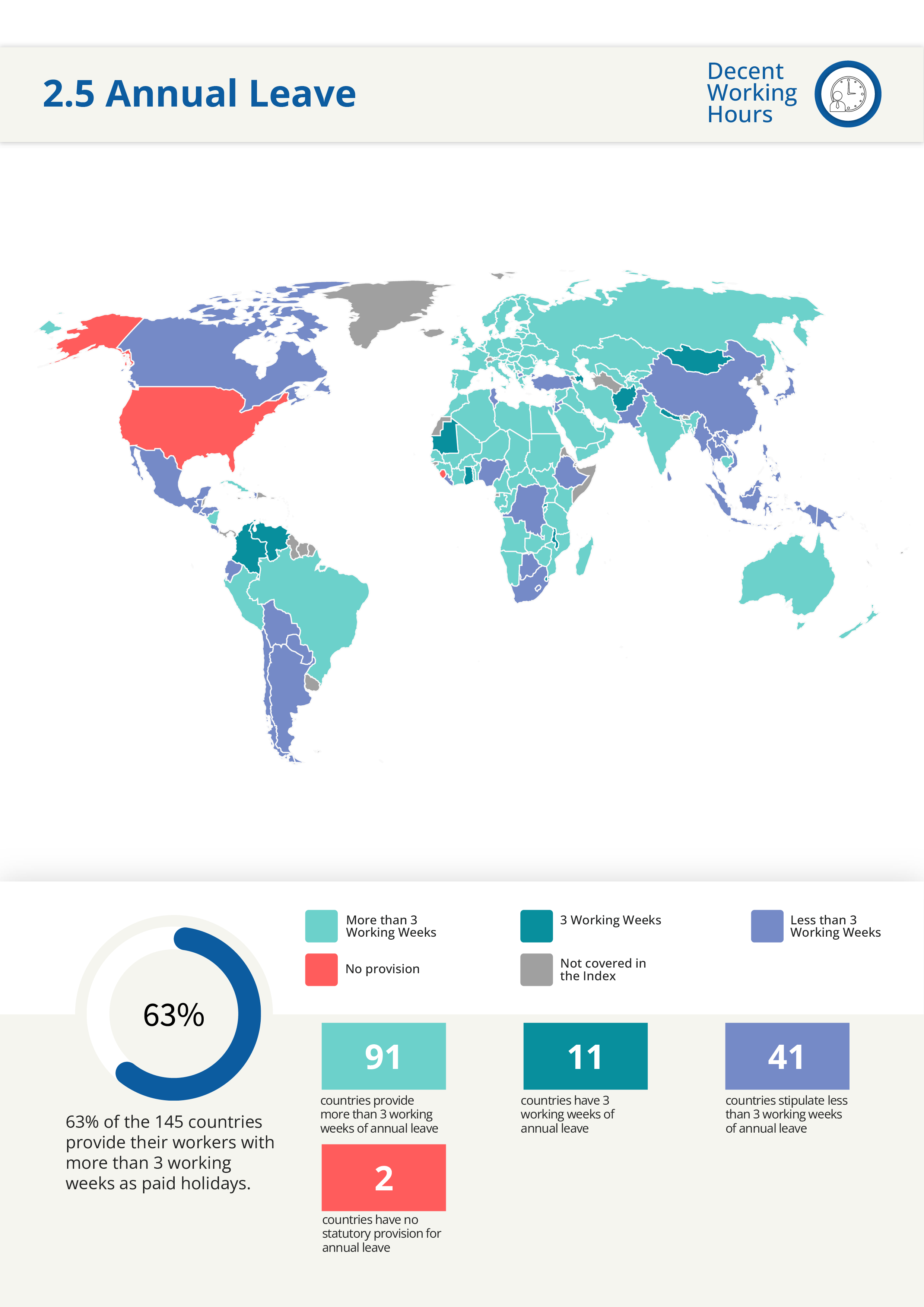
Decent Working Hours - comparative tables
General Weekly Working Hours
| Region | < 40 Hours | 40 hours | 41-47 hours | 48 hours | ≥ 49 hours | Covered Countries |
| Africa | Chad | Benin, Burkina Faso, Cameroon, Central African Republic, Congo, Côte D'Ivoire, Gabon, Ghana, Guinea, Madagascar, Mali, Mauritania, Niger, Nigeria, Rwanda, Senegal, Sierra Leone, Togo | Algeria, Angola, Burundi, Cabo Verde, Democratic Republic of the Congo, Eswatini, Lesotho, Morocco, Namibia, South Africa, United Republic of Tanzania, Zimbabwe | Botswana, Egypt, Ethiopia, Gambia, Liberia, Libya, Malawi, Mozambique, South Sudan, Sudan, Tunisia, Uganda, Zambia | Kenya | 45 |
| Americas | Canada, Chile, Ecuador, United States of America, Venezuela | Brazil, Colombia, Cuba, El Salvador, Honduras | Argentina, Bolivia, Costa Rica, Guatemala, Haiti, Mexico, Nicaragua, Paraguay, Peru | 19 | ||
| Asia | Afghanistan, Azerbaijan, China, Indonesia, Japan, Kazakhstan, Kyrgyz Republic, Mongolia, Oman, Republic of Korea, Syria, Taiwan , Tajikistan, Uzbekistan | Iran, Israel, Singapore, Sri Lanka | Bahrain, Bangladesh, Cambodia, India, Iraq, Jordan, Kuwait, Lao People's Democratic Republic, Lebanon, Malaysia, Myanmar, Nepal, Pakistan, Philippines, Qatar, Saudi Arabia, Thailand, United Arab Emirates, Viet Nam, Yemen | 38 | ||
| Europe | Belgium, Cyprus, France, Netherlands | Albania, Austria, Belarus, Bosnia and Herzegovina, Bulgaria, Croatia, Czechia, Denmark, Estonia, Finland, Georgia, Germany, Greece, Hungary, Italy, Latvia, Lithuania, Luxembourg, Malta, Moldova, Montenegro, North Macedonia, Norway, Poland, Portugal, Romania, Russian Federation, Serbia, Slovakia, Slovenia, Spain, Sweden, Ukraine | Türkiye | Ireland, United Kingdom | 40 | |
| Oceania | Australia | New Zealand | Papua New Guinea | 3 | ||
| Total Countries | 6 | 71 | 22 | 45 | 1 | 145 |
Maximum Weekly Working Hours
| Region | < 48 hours | 48 Hours | 49 - 56 Hours | ≥ 57 hours | No provision | Covered Countries |
| Africa | Benin, Côte D'Ivoire, Morocco, Senegal | Burundi, Cabo Verde, Democratic Republic of the Congo, Guinea, Sierra Leone | Angola, Chad, Lesotho, Liberia, Mozambique, Namibia, South Africa, Uganda, Zimbabwe | Algeria, Botswana, Cameroon, Central African Republic, Congo, Egypt, Ethiopia, Gabon, Kenya, Libya, Mali, South Sudan, Sudan, Togo, Tunisia, United Republic of Tanzania | Burkina Faso, Eswatini, Gambia, Ghana, Madagascar, Malawi, Mauritania, Niger, Nigeria, Rwanda, Zambia | 45 |
| Americas | Brazil, Cuba | Canada | Argentina, Chile, Ecuador, Haiti, Venezuela | Bolivia, Colombia, Costa Rica, Guatemala, Honduras, Mexico, Nicaragua, Paraguay | El Salvador, Peru, United Sates of America | 19 |
| Asia | Israel, Kazakhstan | China, Japan | Azerbaijan, Bangladesh, India, Iraq, Jordan, Kuwait, Mongolia, Republic of Korea, Syria, Taiwan , Tajikistan, United Arab Emirates, Uzbekistan, Viet Nam | Afghanistan, Bahrain, Cambodia, Indonesia, Iran, Kyrgyz Republic, Lao People's Democratic Republic, Lebanon, Malaysia, Myanmar, Nepal, Oman, Pakistan, Qatar, Saudi Arabia, Singapore, Sri Lanka, Thailand, Yemen | Philippines | 38 |
| Europe | Bulgaria, Czechia, Finland, France, Russian Federation, Slovenia, Spain, Sweden, Ukraine | Albania, Austria, Bosnia and Herzegovina, Croatia, Cyprus, Denmark, Estonia, Germany, Greece, Hungary, Ireland, Italy, Latvia, Lithuania, Luxembourg, Malta, Moldova, Montenegro, Netherlands, North Macedonia, Norway, Poland, Portugal, Romania, Serbia, Slovakia, United Kingdom | Belarus, Belgium, Türkiye | Georgia | 40 | |
| Oceania | Papua New Guinea | Australia, New Zealand | 3 | |||
| Total Countries | 17 | 35 | 31 | 44 | 18 | 145 |
Paid Weekly Rest Hours
| Region | 24 Hours | 25 - 36 Hours | ≥ 37 hours | Covered Countries |
| Africa | Algeria, Angola, Benin, Botswana, Burkina Faso, Burundi, Cabo Verde, Cameroon, Central African Republic, Chad, Congo, Côte D'Ivoire, Egypt, Ethiopia, Gabon, Gambia, Guinea, Kenya, Lesotho, Libya, Madagascar, Malawi, Mali, Mauritania, Morocco, Mozambique, Niger, Nigeria, Rwanda, Senegal, South Sudan, Sudan, Togo, Tunisia, Uganda, United Republic of Tanzania, Zambia, Zimbabwe | Eswatini, Liberia, Namibia, South Africa | Democratic Republic of the Congo, Ghana, Sierra Leone | 45 |
| Americas | Bolivia, Brazil, Canada, Chile, Colombia, Costa Rica, Cuba, El Salvador, Guatemala, Haiti, Honduras, Mexico, Nicaragua, Paraguay, Peru, United States of America, Venezuela | Argentina | Ecuador | 19 |
| Asia | Afghanistan, Bahrain, Bangladesh, Cambodia, China, India, Indonesia, Iran, Iraq, Japan, Jordan, Kazakhstan, Kuwait, Kyrgyz Republic, Lao People's Democratic Republic, Malaysia, Myanmar, Nepal, Pakistan, Philippines, Qatar, Republic of Korea, Saudi Arabia, Singapore, Syria, Tajikistan, Thailand, United Arab Emirates, Uzbekistan, Viet Nam, Yemen | Israel, Lebanon, Sri Lanka | Azerbaijan, Mongolia, Oman, Taiwan | 38 |
| Europe | Belgium, Bosnia and Herzegovina, Croatia, Cyprus, Denmark, France, Georgia, Germany, Ireland, Italy, Malta, Montenegro, Portugal, Serbia, Slovenia, Türkiye, United Kingdom | Albania, Austria, Czechia, Finland, Greece, Netherlands, North Macedonia, Norway, Poland, Spain, Sweden | Belarus, Bulgaria, Estonia, Hungary, Latvia, Lithuania, Luxembourg, Moldova, Romania, Russian Federation, Slovakia, Ukraine | 40 |
| Oceania | Australia, Papua New Guinea | New Zealand | 3 | |
| Total Countries | 105 | 19 | 21 | 145 |
Paid Public Holidays
| Region | < 10 Days | 10 Days | 11 - 15 Days | ≥ 16 days | No Provision | Covered Countries |
| Africa | Botswana, Congo, Mozambique, Nigeria, Senegal, Tunisia | Cameroon, Chad, Lesotho | Algeria, Angola, Benin, Burkina Faso, Burundi, Cabo Verde, Central African Republic, Democratic Republic of the Congo, Egypt, Eswatini, Ethiopia, Gabon, Gambia, Ghana, Guinea, Kenya, Liberia, Libya, Madagascar, Malawi, Mali, Mauritania, Morocco, Namibia, Niger, Rwanda, Sierra Leone, South Africa, South Sudan, Sudan, Togo, Uganda, Zambia | Côte D'Ivoire, United Republic of Tanzania, Zimbabwe | 45 | |
| Americas | Canada, Costa Rica, Cuba, Haiti, Mexico, Nicaragua | Argentina, Bolivia, Brazil, Chile, Ecuador, El Salvador, Guatemala, Honduras, Paraguay, Peru, Venezuela | Colombia | United Sates of America | 19 | |
| Asia | India, Iran, Israel, Lao People's Democratic Republic, Philippines, Qatar, Uzbekistan | Viet Nam | Afghanistan, Bahrain, Bangladesh, China, Indonesia, Kazakhstan, Kuwait, Kyrgyz Republic, Malaysia, Mongolia, Nepal, Oman, Pakistan, Republic of Korea, Saudi Arabia, Singapore, Syria, Taiwan , Tajikistan, Thailand, United Arab Emirates, Yemen | Azerbaijan, Cambodia, Iraq, Jordan, Lebanon, Myanmar, Sri Lanka | Japan | 38 |
| Europe | Belarus, Bosnia and Herzegovina, Greece | Belgium, Hungary, Ireland | Albania, Austria, Bulgaria, Croatia, Cyprus, Czechia, Denmark, Estonia, Finland, France, Germany, Italy, Latvia, Lithuania, Luxembourg, Malta, Moldova, Montenegro, North Macedonia, Norway, Poland, Portugal, Romania, Russian Federation, Serbia, Slovenia, Spain, Sweden, Türkiye, Ukraine | Georgia, Slovakia | Netherlands, United Kingdom | 40 |
| Oceania | Papua New Guinea | Asutralia, New Zealand | 3 | |||
| Total Countries | 23 | 7 | 98 | 13 | 4 | 145 |
Annual Leave
| Region | < 3 working weeks | 3 working weeks | > 3 working weeks | No Provision | Covered Countries |
| Africa | Botswana, Democratic Republic of the Congo, Ethiopia, Gambia, Lesotho, Liberia, Nigeria, South Africa, Tunisia | Eswatini, Ghana, Malawi, Mauritania, Rwanda | Algeria, Angola, Benin, Burkina Faso, Burundi, Cabo Verde, Cameroon, Central African Republic, Chad, Congo, Côte D'Ivoire, Egypt, Gabon, Guinea, Kenya, Libya, Madagascar, Mali, Morocco, Mozambique, Namibia, Niger, Senegal, South Sudan, Sudan, Togo, Uganda, United Republic of Tanzania, Zambia, Zimbabwe | Sierra Leone | 45 |
| Americas | Argentina, Bolivia, Canada, Chile, Costa Rica, Ecuador, El Salvador, Guatemala, Haiti, Honduras, Mexico, Paraguay | Colombia, Venezuela | Brazil, Cuba, Nicaragua, Peru | United Sates of America | 19 |
| Asia | China, Indonesia, Israel, Japan, Jordan, Lao People's Democratic Republic, Lebanon, Malaysia, Myanmar, Pakistan, Philippines, Republic of Korea, Singapore, Sri Lanka, Taiwan , Thailand, Viet Nam | Afghanistan, Azerbaijan, Mongolia, Nepal | Bahrain, Bangladesh, Cambodia, India, Iran, Iraq, Kazakhstan, Kuwait, Kyrgyz Republic, Oman, Qatar, Saudi Arabia, Syria, Tajikistan, United Arab Emirates, Uzbekistan, Yemen | 38 | |
| Europe | North Macedonia, Türkiye | Albania, Austria, Belarus, Belgium, Bosnia and Herzegovina, Bulgaria, Croatia, Cyprus, Czechia, Denmark, Estonia, Finland, France, Georgia, Germany, Greece, Hungary, Ireland, Italy, Latvia, Lithuania, Luxembourg, Malta, Moldova, Montenegro, Netherlands, Norway, Poland, Portugal, Romania, Russian Federation, Serbia, Slovakia, Slovenia, Spain, Sweden, Ukraine, United Kingdom | 40 | ||
| Oceania | Papua New Guinea | Australia, New Zealand | 3 | ||
| Total Countries | 41 | 11 | 91 | 2 | 145 |
Decent Working Hours - Snapshot

